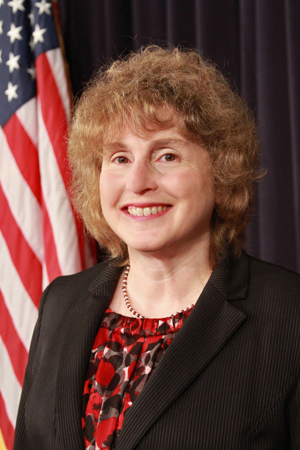Transpo chief says its time to 'get serious' on climate change
 Courtesy
Courtesy
Climate change will become a "huge focus" of the Baker administration's transportation efforts, according to a top state official who said the old method of building pilot-sized shared-use walking-cycling paths does not meet the demands for reducing greenhouse gas emissions.
"The time has come. We've had enough pilots. We've had enough great little projects. We've learned enough. Now, if we're serious, let's get to scale," Transportation Secretary Stephanie Pollack told the Moving Together conference in Boston on Thursday. "Let's make sure that walking, biking and transit make a big dent in our transportation sector greenhouse gas emissions, so that all of us can say that when it came to addressing the most pressing environmental challenge of our generation, we did our part."
In response to a May Supreme Judicial Court ruling, Gov. Charlie Baker issued an executive order earlier this month to push for lower emissions in the transportation sector and elsewhere. Pollack told the audience climate change will become a "huge focus" of the department she leads.
Pollack said the state will issue proposed regulations by the end of the year aimed at reducing transportation sector vehicle emissions, and she told the News Service the regulations would steer people toward "better choices" in motor vehicles, such as electric cars.
"We will be completely redoing the regulation that controls greenhouse emissions from D.O.T.," Pollack said at the conference. She told the News Service, "This is going to be major public conversation."
Environmental groups, renewable energy advocates and the state Democratic Party's platform have pushed for government to respond to the warming of the planet spurred by carbon emissions with a greater sense of urgency.
Pollack said the only way to achieve greenhouse gas reduction objectives is to make greener modes of travel more attractive.
"We are overwhelmingly moving around in the Commonwealth in cars and we need to - you can't force people to change their mind; you can't tell people to not use their cars," Pollack said. "We have to give them better choices so they choose options other than driving."
Under the 2008 state law known as the Global Warming Solutions Act, Massachusetts is required to reduce its emissions to 25 percent below 1990 levels by 2020, and reduce them 80 percent below 1990 levels by 2050.
The state's transportation emissions in 2012 stood at 30.4 million metric tons, which is higher than the 1990 level, while the residential, commercial and especially the electricity consumption emissions have all dropped, according to the Department of Energy Resources.
While MBTA management seeks to transform it from a financially hampered system in poor repair into a well-oiled and more self-sufficient system, automakers continue to push out new models annually, buttressed by television ads touting new features. After climbing for years, gasoline prices have dropped more recently, reducing an incentive for people to drive less.
Pollack acknowledged that in many parts of the state driving is the only viable option for people. Pollack's biggest challenge, she said, remains improving the MBTA, which carries people on more than 1 million trips per weekday by train, ferry, trolley, bus and subway car.
Building bike and pedestrian infrastructure on a greater scale can involve more grants to cities and towns, who own the vast majority of the state's roadways, or direct support from the state on a project, such as MassDOT's work to incorporate cycling facilities along Boston's Commonwealth Avenue, Pollack told the News Service.
Pollack said in the new five-year $14.8 billion transportation capital plan, $180 million is devoted to bikeways and pedestrian paths, which she said is on par with the spending for highway resurfacing.
"I am excited about the idea of getting walking, biking and transit to scale," Kirstie Pecci, a staff attorney at MASSPIRG, told the News Service. Pecci said there are still "transportation deserts" in Boston, and system expansion and modernization - such as the proposed North-South Rail Link and overnight service - would be necessary to truly accomplish the goal of bringing the MBTA "to scale."
Pecci, who lives in central Massachusetts, said there should be enough walking, cycling and transit options around Boston so that the Massachusetts Turnpike is not backed up from Framingham eastward every day. MassDOT is moving forward with a new electronic payment system that will make travelling the length of Interstate 90 cheaper for those who obtain an EZPass transponder from the state.
Baker's executive order called for measures to reduce greenhouse gas emissions as well as planning to prepare the state for the harsh weather that could accompany planetary warming. Superstorm Sandy, which flooded New York City tunnels and led to long lines outside New York gas stations, demonstrated how a major storm can damage transportation infrastructure.
David Watson, a consultant who was the executive director of MassBike, an advocacy group, told the News Service that the "most important thing that the state could do is dramatically ramp up education for kids" about traffic safety.









0 Comments